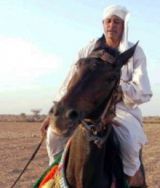Suspected Darfur militia chief rejects foreign court
By Opheera McDoom
MISTIRIYHA, Sudan, May 11 (Reuters) – An Arab tribal chief accused by the United States of leading a dreaded militia in Darfur said on Wednesday he would not go to a court outside Sudan but would accept a fair trial in the country.

|
|
Musa Hilal, an Arab tribal chief accused by the United States of leading a dreaded militia in Darfur, rides his horse in Misitiriyha in north Darfur, Sudan, May 10, 2005. (Reuters). |
But speaking at a military camp in his home area, Musa Hilal told Reuters that if national trials for war crimes in the western region were injust or political, he would fight this with all the means at his disposal.
He denied any involvement in atrocities in Darfur and blamed the war on the mostly non-Arab rebels who launched an insurgency against the Arab-dominated government in early 2003.
“I respect my homeland and so I have to respect a national court,” he said in the camp in North Darfur. “As for a foreign court, this I do not agree with.”
But if a domestic trial was not fair and he failed to defend himself by legal means, “then people have a right to defend themselves using all means at their disposal.”
Hilal declined to elaborate, but family sources said they would take up arms if he was made a scapegoat.
The United Nations Security Council in March referred alleged war crimes in Darfur to the International Criminal Court (ICC) in The Hague for investigation, the first such referral.
Sudan has rejected sending any citizens to a foreign court but has hinted it would form its own independent court to work with the ICC on prosecutions.
A U.N.-appointed commission of inquiry last month gave the ICC a sealed list of 51 senior government and military officials, militia and rebel leaders and foreign army commanders suspected of crimes against humanity in the remote region.
U.N. sources have said Hilal, who heads Darfur’s largest Arab tribe, is likely to be on the list.
The U.S. State Department has accused him of being a leader of Arab militias known locally as Janjaweed.
KHARTOUM ACCUSED
The conflict broke out two years ago after rebels took up arms against the government, complaining of discrimination.
Khartoum is accused of retaliating by arming militias, who burned down villages and killed and raped civilians.
At least 180,000 people have died from violence, hunger and disease and 2 million have been driven out of their homes.
Hilal said his role in the conflict was one of coordination only. He said he directed the youth of his people to join the army, police and the popular defense forces (PDF).
The international community sees the PDF as a militia called on by the government to work alongside the army in times of trouble. Hilal said it was not a militia but more like army reserves.
He also denied leading any force to the battlefield, despite witness statements documented by rights groups placing him at the scene of several battles.
“The popular defense force is not Janjaweed. It is a military organization belonging to the central command of the army,” he said.
“I don’t feel I am a criminal. I am a Sudanese civilian and I have the right to share in the stability of my country.”
More than 3,000 men from the PDF, army and police were being trained at the military training camp in Mistiriyha, 200 km (125 miles) west of the capital of North Darfur state, El-Fasher.
Hilal said that during any war abuses occurred and that was the nature of war. But, he said, the rebels bore the responsibility for the conflict and the abuses because they started fighting instead of talking with the government.
“The rebels are the cause of the war. They are the ones who took up arms before the PDF, before the state and the proof of that is that they attacked El-Fasher before the government announced war against them,” he said.
He said they also attacked civilians in big towns in North Darfur in early 2003, targeting people from Arab tribes.
